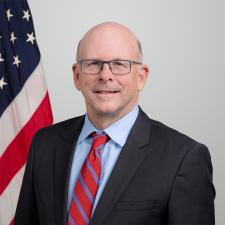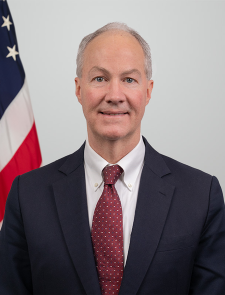Human Foods Program Also referred to as: HFP
About | Risk Prioritization | Organization | Leadership | Stay Connected | Resources
About HFP
The Human Foods Program (HFP) oversees all FDA activities related to food safety and nutrition, organized in a single group working under the Deputy Commissioner of Human Foods. Our vision is to ensure that food is a source of wellness for all U.S. consumers, and our day-to-day activities are focused at protecting and promoting the health and wellness of all people through science-based approaches to prevent foodborne illness, reduce diet related chronic disease, and ensure chemicals in food are safe. The Office of the Deputy Commissioner for Human Foods supports this work by providing leadership and strategic direction for all FDA-wide HFP activities, including food related inspections and investigations. View the HFP FY 2025 Priority Deliverables and overview of the HFP Operating Model.
Risk Prioritization
The Human Foods Program centralizes our risk management activities into three main areas that run on parallel tracks, each with its own priorities.
- Microbiological Food Safety: The Office of Microbiological Food Safety works to advance strategies to prevent pathogen-related foodborne illness in close collaboration with other regulatory agencies, states, industry, and other stakeholders. Conrad Choiniere, Ph.D., is the director of OMFS.
- Food Chemical Safety: The Office of Food Chemical Safety, Dietary Supplements, and Innovation focuses on food chemical safety and dietary supplement policy and coordinates on regulatory and scientific issues for foods made through innovative technologies. Mark Hartman, MA, MPA, is the director of OFCSDSI.
- Nutrition: The Nutrition Center of Excellence elevates and empowers action on nutrition science, policy, and initiatives to help reduce the burden of diet-related chronic diseases, improve health equity, and ensure the nutritional adequacy and safety of infant formula. Robin McKinnon, Ph.D., MPA, has been selected to serve as the acting director of the NCE.
Organization
The Human Foods Program is also supported by the offices of:
- Communications, Education & Engagement
- Led by Sharmi Das, MHS (acting)
- Compliance & Enforcement
- Led by Ann Oxenham, JD
- Coordinated Outbreak Response, Evaluation & Emergency Preparedness
- Led by Stic Harris, DVM, MPH
- Executive Programs
- Led by Laura Pillsbury, MPPA
- Integrated Food Safety System Partnerships
- Led by Erik Mettler, MPA, MPH
- Laboratory Operations & Applied Science
- Led by Kis Robertson Hale, DVM, MPH, DACVPM
- Policy & International Engagement
- Led by Megan Velez, JD, MPH
- Resource Management
- Led by Jeff Domanski
- Strategic Programs
- Led by Suzanne Roosen, MPA
- Surveillance Strategy & Risk Prioritization
- Led by Katie Vierk, MPH (acting)
- Quality Assessment & Management
- Led by Ellen Buchanan (acting)
HFP Leadership
Meet the Deputy Commissioner for the Human Foods Program
Jim Jones joined the U.S. Food and Drug Administration in September 2023 as the agency’s first Deputy Commissioner for Human Foods.
In this role, which reports directly to the FDA Commissioner, Jones leads the unified Human Foods Program (HFP), overseeing all FDA food safety and nutrition activities. He exercises decision-making authority over all HFP entities, including resource allocation, risk-prioritization strategy, policy, major response activities involving human foods. Jones came to the FDA with a thorough knowledge of the foods program, having served on the Reagan-Udall Foundation’s Independent Expert Panel that evaluated the program in 2022.
He has decades of leadership experience and a track record of forging partnerships among diverse segments of stakeholders and achieving dynamic results to improve public health. Jones spent most of his career as a federal regulator of pesticides, toxic substances, chemical safety, and pollution prevention at the U.S. Environmental Protection Agency (EPA) and spent much of his tenure involved in leadership and decision-making related to food safety. He held positions of increasing responsibility at EPA and made public health-based decisions grounded in sound science, public policy, and law. As a principal architect of the 2016 overhaul of the Toxic Substances Control Act, Jones led discussions with members of Congress, industry and environmental groups that resulted in a law reshaping how chemical safety is managed in the U.S. He also led several national level sustainability programs, including the Environmental Preferable Purchasing Program and the Presidential Green Chemistry Awards Challenge.
From 2017 to 2020, Jones worked for the Household and Commercial Products Association as Executive Vice President for Strategic Alliances and Industry Relations, forging relationships with a wide variety of stakeholders and leading sustainability and green chemistry efforts. He then ran his own company advising clients on issues related to chemical safety and sustainability.
He holds a bachelor’s degree in economics from the University of Maryland, and a master’s degree in economics from the University of California at Santa Barbara.
Principal Deputy Director for Human Foods
Dr. Donald A. Prater is the Principal Deputy Director for Human Foods. He previously was Acting Director of the FDA’s Center for Food Safety and Applied Nutrition, a role he took on in 2023. As Acting Director, he adeptly helped lead the Center during a time of transition, prioritizing nutrition and the safety of the food supply, dietary supplements, and cosmetics while helping to re-envision the organization.
Since 2019, he had been the Associate Commissioner for Imported Food Safety in Office of Food Policy and Response, providing direction to and management of imported food safety programs. In addition, he served as a senior scientific advisor and technical expert on matters related to human and animal food safety and the implementation of the FDA Food Safety Modernization Act. Earlier in his FDA tenure, Dr. Prater was Director of the FDA’s Europe Office in Brussels, Belgium and the Department of Health and Human Services Country Representative to the European Union. Dr. Prater received a Doctor of Veterinary Medicine from the Virginia-Maryland Regional College of Veterinary Medicine (government and corporate track) in 1996. Following a three-year residency in anatomic pathology, he joined the FDA’s Center for Veterinary Medicine (CVM) in 1999 as a Veterinary Medical Officer. There he served in several roles including leader of the Aquaculture Drugs Team, CVM Pathologist, and Director of the Division of Scientific Support.
Stay Connected
FDA Foods on X (formerly Twitter)
Sign up for HFP Constituent Updates
Sign up for Email Updates on various topics
Report a problem, Ask Questions



